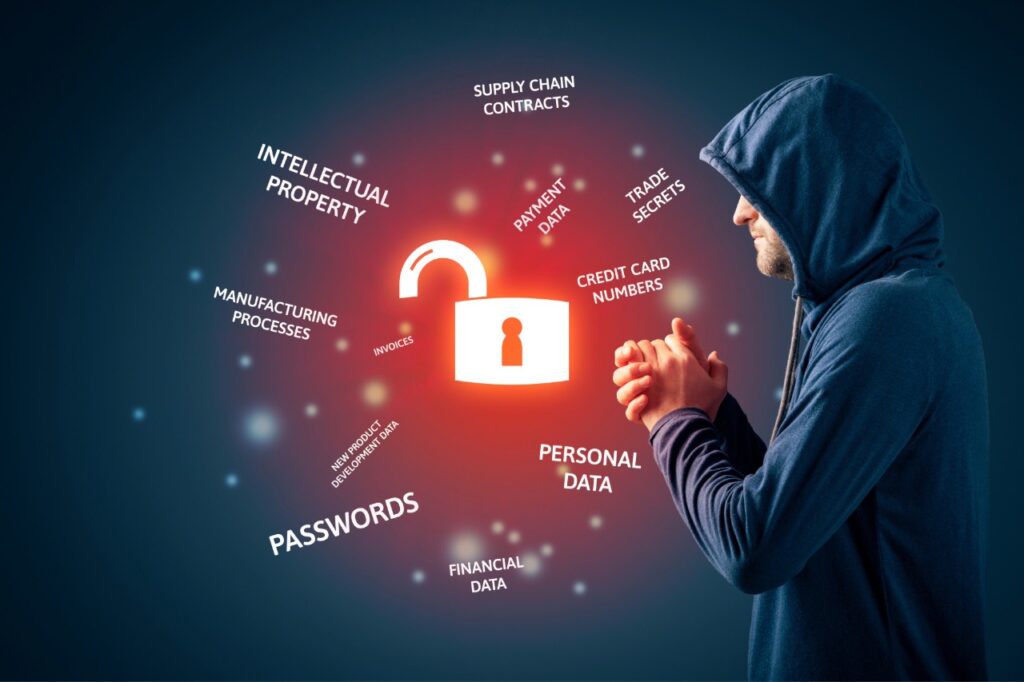Naturally, the first step to enhance your data’s security is gearing up your computer with quality security software. There is a wide variety of paid and free options out there, and all you need to do is find the one that suits you. For starters, look for reviews or consider finding review-based materials, such as a free alternative to Avast. Nevertheless, it is always helpful to the basics!
Who Can Fall Victim of Data Leak?
Personal data is any information about a person that is associated with them. It usually allows them to be fully identified or obtain other information about them and perform any operations with their personal life or property. Many people are at risk of having important information stolen when processing personal data. They usually refer to:
People using bank cards; People receiving medical services; Pension savings owners; Bank depositors; Property owners.
This is not a complete list; many others can suffer from personal data leakage. Notably, each of us has a bank card and goes to the doctor. Therefore, such an event of a leak may happen to us.
Data Leakage Reasons
Of course, each event or issue has its reasons. Any organization that processes personal data in its activities is obliged to take organizational and technical measures to protect them. The list of these measures and methods is regulated for each data group. When developing a system of such technical and administrative solutions, a threat model is used, which takes into account two types of risks, external and insider ones.
The first type of threat represents illegal access to the protected information perimeter of the operating organization. Basically, it’s a hacker attack. The latter is implemented more often. A person provides information about them in many cases, such as in a medical institution, in a travel agency, where they almost completely disclose information about their financial status.
The consent to the processing of personal data is often not signed. Thus, ID data, information about real estate, income, bank card transactions appear on a potentially unprotected computer, which may not even have antivirus software. In this case, access to the data becomes possible:
in case of direct penetration of an unscrupulous agency employee into a computer or material storage media; when info appears in cloud networks, sometimes on many servers, the legislation requires the mandatory storage of personal data within the country, but these requirements are not met by all providers, who often don’t even know about the existence of such a condition; when a laptop or a briefcase of a company employee is stolen, and it contains information of interest to the attacker.
Many cases are reflected in court practice. Doctors or employees of banking institutions are known to be fined or otherwise punished for leaking information. There is another example related to the cloud exposure of passport data. It indicates the existence of such a problem and its gravity.
Data Leakage Consequences
The consequences of leaks can be severe for both data owners and providers. For the former, there are numerous risks of becoming a victim of intruders. They may suffer from:
the disclosure of any information related to the person; blackmail; illegal debiting of funds from a bank card; interference with privacy; threats to children, for example, in the case of publication of data about the schools they go to in media.
The minimum risk will be the unauthorized transmission of information, such as email addresses, to any companies that begin to harass their advertiser. But even this makes it possible to initiate a case for both illegal advertising and data breach and will lead to providers’ fines if the source of the leak or spam can be reliably identified. Companies who have leaked personal data, in turn, will face the following liabilities:
civil, in the form of judicial recovery of losses and moral damage incurred by the victims; administrative, in the form of a fine, suspension, or prohibition of activities related to the processing of personal data; criminal, in case of unlawful distribution of personal data, causing significant damage and transfer of information to law enforcement agencies.
How to Avoid Grave Consequences from Data Leaks
Measures to protect information require the fulfillment of the obligations established by law by operators and prudence from the holders of personal data. These are measures such as:
installation of firewalls that prevent hacking your personal accounts; establishing a system of identification and authentication of employees who have access to them; recording in the logs of all actions of specialists dealing with data processing, which makes it possible to understand what exactly they did with the information protected by law; installation of security software; use of means of cryptographic protection to encrypt data during storage and transmission; application of methods and measures that can prevent data leakage through physical channels, for example, by photographing a computer screen, removing audio information, intercepting electromagnetic radiation.
All of these measures to prevent data stealth are significant, but they are implemented in most government agencies and large companies. Small businesses, more often operating in the market for providing B2C services, remain at risk.
Rules to Follow
Hence, it is advised to all the personal data holders, a.k.a. regular people, to exercise discretion when choosing and interacting with service providers. Here are some rules to consider:
Bottom Line
The caution by both operators and users will minimize risks. Every leak can lead to problems of different scales. However, it is crucial to know and follow the basics of proper data usage and sharing, see who you trust your data to, and check what you agree to, hitting the “I agree” button.

